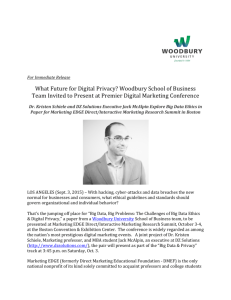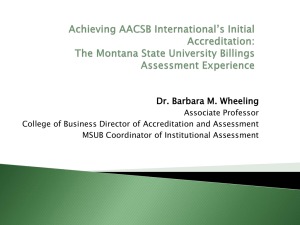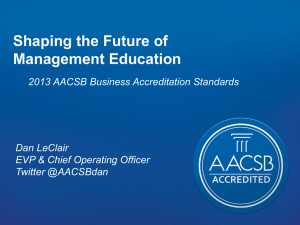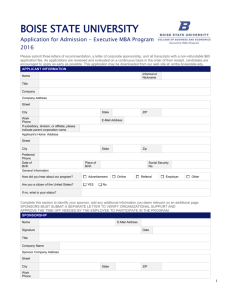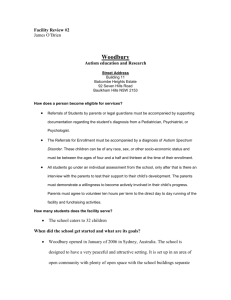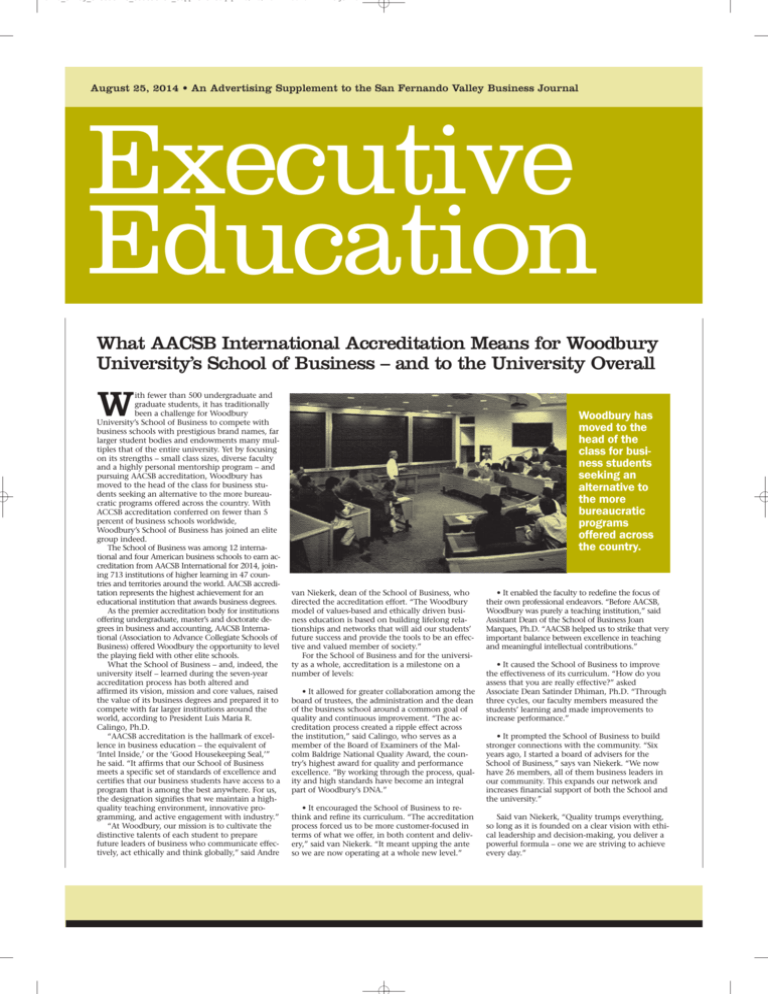
16 20_sfvbj_executive_education_supplement.qxp
8/20/2014
8:28 PM
Page 16
August 25, 2014 • An Advertising Supplement to the San Fernando Valley Business Journal
Executive
Education
What AACSB International Accreditation Means for Woodbury
University’s School of Business – and to the University Overall
W
ith fewer than 500 undergraduate and
graduate students, it has traditionally
been a challenge for Woodbury
University’s School of Business to compete with
business schools with prestigious brand names, far
larger student bodies and endowments many multiples that of the entire university. Yet by focusing
on its strengths – small class sizes, diverse faculty
and a highly personal mentorship program – and
pursuing AACSB accreditation, Woodbury has
moved to the head of the class for business students seeking an alternative to the more bureaucratic programs offered across the country. With
ACCSB accreditation conferred on fewer than 5
percent of business schools worldwide,
Woodbury’s School of Business has joined an elite
group indeed.
The School of Business was among 12 international and four American business schools to earn accreditation from AACSB International for 2014, joining 713 institutions of higher learning in 47 countries and territories around the world. AACSB accreditation represents the highest achievement for an
educational institution that awards business degrees.
As the premier accreditation body for institutions
offering undergraduate, master’s and doctorate degrees in business and accounting, AACSB International (Association to Advance Collegiate Schools of
Business) offered Woodbury the opportunity to level
the playing field with other elite schools.
What the School of Business – and, indeed, the
university itself – learned during the seven-year
accreditation process has both altered and
affirmed its vision, mission and core values, raised
the value of its business degrees and prepared it to
compete with far larger institutions around the
world, according to President Luis Maria R.
Calingo, Ph.D.
“AACSB accreditation is the hallmark of excellence in business education – the equivalent of
‘Intel Inside,’ or the ‘Good Housekeeping Seal,’”
he said. “It affirms that our School of Business
meets a specific set of standards of excellence and
certifies that our business students have access to a
program that is among the best anywhere. For us,
the designation signifies that we maintain a highquality teaching environment, innovative programming, and active engagement with industry.”
“At Woodbury, our mission is to cultivate the
distinctive talents of each student to prepare
future leaders of business who communicate effectively, act ethically and think globally,” said Andre
Woodbury has
moved to the
head of the
class for business students
seeking an
alternative to
the more
bureaucratic
programs
offered across
the country.
van Niekerk, dean of the School of Business, who
directed the accreditation effort. “The Woodbury
model of values-based and ethically driven business education is based on building lifelong relationships and networks that will aid our students’
future success and provide the tools to be an effective and valued member of society.”
For the School of Business and for the university as a whole, accreditation is a milestone on a
number of levels:
• It allowed for greater collaboration among the
board of trustees, the administration and the dean
of the business school around a common goal of
quality and continuous improvement. “The accreditation process created a ripple effect across
the institution,” said Calingo, who serves as a
member of the Board of Examiners of the Malcolm Baldrige National Quality Award, the country’s highest award for quality and performance
excellence. ”By working through the process, quality and high standards have become an integral
part of Woodbury’s DNA.”
• It encouraged the School of Business to rethink and refine its curriculum. “The accreditation
process forced us to be more customer-focused in
terms of what we offer, in both content and delivery,” said van Niekerk. “It meant upping the ante
so we are now operating at a whole new level.”
• It enabled the faculty to redefine the focus of
their own professional endeavors. “Before AACSB,
Woodbury was purely a teaching institution,” said
Assistant Dean of the School of Business Joan
Marques, Ph.D. “AACSB helped us to strike that very
important balance between excellence in teaching
and meaningful intellectual contributions.”
• It caused the School of Business to improve
the effectiveness of its curriculum. “How do you
assess that you are really effective?” asked
Associate Dean Satinder Dhiman, Ph.D. “Through
three cycles, our faculty members measured the
students’ learning and made improvements to
increase performance.”
• It prompted the School of Business to build
stronger connections with the community. “Six
years ago, I started a board of advisers for the
School of Business,” says van Niekerk. “We now
have 26 members, all of them business leaders in
our community. This expands our network and
increases financial support of both the School and
the university.”
Said van Niekerk, “Quality trumps everything,
so long as it is founded on a clear vision with ethical leadership and decision-making, you deliver a
powerful formula – one we are striving to achieve
every day.”
16 20_sfvbj_executive_education_supplement.qxp
8/20/2014
AUGUST 25, 2014
3:07 PM
Page 17
AN ADVERTISING SUPPLEMENT TO THE SAN FERNANDO VALLEY BUSINESS JOURNAL 17
CONGRATULATIONS
WOODBURY UNIVERSITY SCHOOL of BUSINESS
THE BOARD OF ADVISORS EXTENDS ITS SINCERE CONGRATULATIONS TO
DEAN ANDRE VAN NIEKERK, THE FACULTY, STAFF AND STUDENTS FOR EARNING
THE AACSB INTERNATIONAL ACCREDITATION!
Woodbury University was founded in 1884 to respond to the emerging needs of a thriving business community
in Los Angeles. Meeting the business education needs of today’s diverse economy, Woodbury University’s School of Business
offers an undergraduate Bachelors in Business Administration (BBA) and the Masters in Business Administration (MBA).
Mentorship is a key differentiating factor of the School of Business, along with the four pillars upon which a
Woodbury University education rests: Entrepreneurship, Design Thinking, Civic Engagement and Transdisciplinarity.
SCHOOL OF BUSINESS BOARD OF ADVISORS
GEORGE ABA
Chief Financial Officer
The Outdoor Recreation Group
JOHN M. KRAMBEER
CEO & Founder
Camden Capital Management, LLC
ROBERT H. BAKER
President, Bob Baker Enterprises, Inc.
& Bob Baker Auto Group
GREG LIPPE, CPA
Advisory Board Chairman
Gregory N. Lippe Accountancy Corporation
JASON BENDER
President
In Focus Advertising
RICK LOMBARDO
General Manager, Hispanic Products
Unified Grocers
KIP DELLINGER, CPA
Cooper Moss Resnick Klein & Co. LLP
TIMOTHY K. MCCARTHY
Executive Vice President
The Whittier Trust Company
NICHOLAS HACOPIAN
President
Glen West Management & Realty
JOHN C. HUMPHREY
Senior Vice President
Global Automotive Practice
J.D. Power
AFSHIN KATEB
Chief Financial Officer
Nazarian Enterprises and Nimes Capital
MARIA MEHRANIAN
Managing Partner/CFO
Cordoba Corporation
WALTER MOSHER, Ph.D.
Founder of Precision Dynamics Corporation
THOMAS W. OLIVER, Ed.D.
SUNDER RAMANI
President, Penta Resources, Inc.
WILLIAM SANCHEZ
Vice President Tax Management
City National Bank
ERNIE SCHAEFFER
Retired, Schaeffer Magnetics
NEIL SHERMAN
CEO, Industrial Metal Supply Company
JANE A. SKEETER
Founder/CEO
ULTRAGLAS, Inc.
PATRICIA JONES WINOGRAD, Esq.
Glaser Weil LLP
ARTHUR ZENIAN
CEO and Founder
enBio, Corp.
TRACY RAFTER
CEO, BizFed
Los Angeles County Business Federation
AACSB accreditation is the hallmark of excellence in business education earned
by less than 5% of Business Schools worldwide. The AACSB accreditation
designation signifies a high-quality teaching environment, innovative
programming and active engagement within the industry.
woodbury.edu/school-of-business
16 20_sfvbj_executive_education_supplement.qxp
8/20/2014
8:28 PM
Page 18
18 AN ADVERTISING SUPPLEMENT TO THE SAN FERNANDO VALLEY BUSINESS JOURNAL
AUGUST 25, 2014
EXECUTIVE EDUCATION
Executive Coaching: Yesterday’s Luxury, Today’s Necessity
T
oday’s leaders need someone in
their professional circle who listens,
has positive assumptions about
their intentions, and is a constant
reminder of their ability to achieve their
highest career aspirations. Executive
Coaches are trusted and objective sounding boards for a business leader’s most sensitive or challenging work situation.
Since the 1980’s the field of executive
coaching has exploded in popularity.
Once believed to be a status symbol for
elite leaders, “I’ll need to consult with my
executive coach before I make a final decision.” Today leaders at all levels are realizing the benefits of having a dedicated
coach to enhance their insights, strategic
thinking and problem-solving capabilities. Executive Coaches help business
leaders improve communication skills,
leadership abilities, and overall effectiveness. Many forward thinking organizations offer executive coaching as a component of leadership development.
Leaders work with coaches to improve
learning and application of new leadership practices through focused skill-building. In today’s leadership circles, executives are touting the benefits of having a
coach and the impact on their careers.
Typically, the majority of coaching
clients are already performing well in
their particular role. This runs counter to
the notion that executive coaches are
brought in only to work with underperformers and are tasked with “fixing
them,” which is an outdated view.
The higher up you go in a company,
the less available and reliable the feedback. Executives consistently complain
about people only telling them what they
think they want to hear versus the truth
about situations and their leadership
style. Executive coaches can utilize various assessments (e.g. interviews, 360
degree surveys, leadership instruments,
etc.) to obtain valuable information that
allow leaders to understand their current
performance, strengths, opportunities for
growth, and ways to measure progress.
Even top performers benefit from having someone in their corner providing
honest feedback and holding them
accountable for following through on
their commitments to themselves, their
team, and their organization. If you think
of the most celebrated world leaders,
scholars, entertainers, athletes, and CEOs,
they all have something in
common…someone providing valuable
feedback and encouraging them to take
their performance to the next level.
Some of the many benefits of having
an executive coach include improving
focus, awareness of how others view you,
utilization of strengths, time management, influence and political savvy,
career options, confidence, commitment,
executive presence, and overall effectiveness. In addition, the organization stands
to gain from a leader with enhanced
leadership capabilities, who is more
engaged and has stronger working relationships. As a result, there is greater
retention, more innovation, and
improved business outcomes and competitive advantage.
The quality of the coaching outcome relies largely on the background of the executive coach, specifically, their experience and
training. Despite good intentions and a
friendly personality, executive coaches
should be adequately trained in proper
techniques, processes, tools, and evaluation.
Phillips Graduate Institute is offering a 5
month Executive Coach Certification Program that starts in October 2014 (requiring
one Friday and Saturday commitment each
month). This program is an International
Coach Federation (ICF) approved certification
taught by their highest ranking member of
the organization, the Chair of the ICF Global
Board. If you are interested in this unique opportunity (there is limited availability),
please contact Dr. Denise Wolfe at dwolfe@
pgi.edu to receive more details about the program and how you (or your employees) can
gain the requisite knowledge and skills to
become a highly effective executive coach.
Executive MBA Council Reports Five-year Trends from
Annual Membership Program Survey
R
esponding to changing industry
dynamics and student expectations, more Executive MBA
(EMBA) programs are using digital materials. The percentage of course materials that
programs deliver electronically has tripled
since 2010, the first year data on electronic
delivery was gathered, according to results
of the 2013 Membership Program Survey
of the Executive MBA Council.
"Many EMBA students travel during
the program, and delivering course materials electronically lightens the load for
them," said Michael Desiderio, executive
director of the EMBA Council. "As one
application of technology, electronic
materials offer all time-strapped EMBA
students convenient access to course
materials. EMBA programs will continue
to explore ways that technology can
enhance the student experience."
The EMBA Council sponsors its
Membership Program Survey each year to
help track industry developments. The
survey offers a comprehensive overview
of worldwide member programs. In 2013,
314 member programs - or 96 percent participated in the survey.
Program structure and delivery
The number of EMBA programs that
reported changing program delivery, such
as offering new electives, program format
or services, tripled over the past five
years. Leadership, innovation/entrepreneurship and law are the top three new
non-elective courses offered by programs.
Nearly two-thirds of EMBA programs
offer career services, and alumni networking is the most common and fastest
growing service.
Over the past five years, there has been
a shift toward less frequent class meetings.
Nearly 66 percent of programs require a
global trip. China continues to be the most
popular destination, followed by Brazil.
Average class size is once again 43, and
the average program length continues to
be 20 months.
Program costs and tuition reimbursement
The average program cost is $73,401,
up 1 percent from previous year.
More EMBA students are paying their
own way than ever before. Forty-one (41)
percent of EMBA students are fully selffunded, up from 34 percent in 2009.
Twenty-four (24) percent of students
receive full financial sponsorship.
In response to the increasing the number
of students self-funded, 53 percent of programs offer scholarships and fellowships.
percent of EMBA students are female.
Programs outside the U.S. and Canada
have a lower percentage of females in
their current classes.
About the students
The average years of management
experience is 8.5 and the average years of
work experience is 13.7, two findings
that have changed minimally over the
past five years.
The percentage of female students during the past five years has fluctuated
between 25 and 26 percent. In 2013, 25.3
The EMBA Council provides a place for programs to share best practices and gathers
industry data. Currently the council includes
more than 200 educational institutions that
administer 300 plus EMBA Programs worldwide. For additional information, visit
www.embac.org. To learn more about the
EMBA experience, visit
www.executivemba.org.
The Top Eight Reasons to Get That MBA Degree
1. Advance Your Career
If your present career path is a less
than perfect fit for your aptitudes and
interests, one of the benefits of an MBA
program is that it allows you the flexibility
to explore your options and provides you
with the training you need to change
careers. If you’re satisfied with your current line of business, a master of business
administration degree can prepare you to
move into a managerial position within
your field.
2. Earn More Money with an MBA
Degree
According to PayScale.com’s salary survey, you’ll earn $27,000 a year more over a
bachelor’s degree-holder with an MBA.
3. Get Paid Training (and a Raise) from
Your Employer
As today’s marketplace evolves and
becomes increasingly complex, many
employers are choosing to balance their
need to retain good employees with their
need to fill managerial positions with candidates possessing advanced-level knowl-
edge and skills. They’re doing this by sending selected employees to business
school—and footing the bill.
4. Start Your Own Business
Interested in starting your own business,
but not sure you have the necessary expertise to launch a start-up in a high-growth
industry? An MBA can prepare you to do
everything from writing a business plan to
acquiring venture capital to launching an
IPO. Research has shown that the failure
rate for small businesses started by MBAs
is about 50 percent less than the standard
failure rate.
5. Develop Business Savvy and Expertise
Quickly
An MBA program will put you on the fasttrack to career advancement by offering
you the chance to develop a wide range of
general business knowledge and a broad
base of technical skills in a relatively short
period of time, as opposed to the years-long
trial-and-error process that tends to characterize knowledge and skill gleaned from onthe-job learning.
6. Become a Leader in an Emerging Field
A recent proliferation of “niche” Master
of Business Administration programs
means that you can not only look to business school for a firm grounding in the basics, but for innovative education that can
lead to an exciting career in a newly emerging field such as brand management, information technology, e-commerce or mobile
telecommunications—just to name a few.
7. Gain Valuable Networking Resources
Networking is another key benefit.
Business school teaching styles encourage
teamwork, and over the course of an MBA
program, you’ll develop important relationships that can serve you well throughout
your business career. And no matter the
school, you can often get plugged into a
network of alumni working at a wide range
of companies. This is useful for mentoring,
job searches and professional contacts.
8. Enjoy Greater Job Security
MBA grads are desirable in any job market; an MBA will give you the opportunities
you need to advance in the business world.
16 20_sfvbj_executive_education_supplement.qxp
8/20/2014
8:28 PM
Page 19
AUGUST 25, 2014
AN ADVERTISING SUPPLEMENT TO THE SAN FERNANDO VALLEY BUSINESS JOURNAL 19
EXECUTIVE EDUCATION
Motivation is the Key to Success in Executive Education
By MATTHEW WELLER
B
asic principles of motivation exist
that are applicable to learning in
any education situation.
1. The environment can be used to focus
the student’s attention on what needs to
be learned.
Teachers who create warm and accepting yet business-like atmospheres will
promote persistent effort and favorable
attitudes toward learning. This strategy
will be successful in children and in
adults. Interesting visual aids, such as
booklets, posters, or practice equipment,
motivate learners by capturing their
attention and curiosity.
2. Incentives motivate learning.
Incentives include privileges and receiving praise from the instructor. The instructor determines an incentive that is likely to
motivate an individual at a particular time.
In a general learning situation, self-motivation without rewards will not succeed.
Students must find satisfaction in learning
based on the understanding that the goals
are useful to them or, less commonly,
based on the pure enjoyment of exploring
new things.
3. Internal motivation is longer lasting and
more self-directive than is external motivation, which must be repeatedly reinforced
by praise or concrete rewards.
Some individuals — particularly children of certain ages and some adults —
have little capacity for internal motiva-
tion and must be guided and reinforced
constantly. The use of incentives is based
on the principle that learning occurs
more effectively when the student experiences feelings of satisfaction. Caution
should be exercised in using external
rewards when they are not absolutely
necessary. Their use may be followed by
a decline in internal motivation.
4. Learning is most effective when an individual is ready to learn, that is, when one
wants to know something.
Sometimes the student’s readiness to
learn comes with time, and the instructor’s role is to encourage its development. If a desired change in behavior is
urgent, the instructor may need to supervised directly to ensure that the desired
behavior occurs. If a student is not ready
to learn, he or she may not be reliable in
following instructions and therefore
must be supervised and have the instructions repeated again and again.
5. Motivation is enhanced by the way in
which the instructional material is organized.
In general, the best organized material makes the information meaningful to
the individual. One method of organization includes relating new tasks to
those already known. Other ways to
relay meaning are to determine whether
the persons being taught understand
the final outcome desired and instruct
them to compare and contrast ideas.
None of the techniques will produce sustained motivation unless the goals are realis-
tic for the learner. The basic learning principle involved is that success is more predictably motivating than is failure.
Ordinarily, people will choose activities of
intermediate uncertainty rather than those
that are difficult (little likelihood of success)
or easy (high probability of success). For
goals of high value there is less tendency to
choose more difficult conditions. Having
learners assist in defining goals increases the
probability that they will understand them
and want to reach them. However, students
sometimes have unrealistic notions about
what they can accomplish. Possibly they do
not understand the precision with which a
skill must be carried out or have the depth
of knowledge to master some material. To
identify realistic goals, instructors must be
skilled in assessing a student’s readiness or a
student’s progress toward goals.
1. Because learning requires changes in
beliefs and behavior, it normally produces
a mild level of anxiety.
This is useful in motivating the individual. However, severe anxiety is incapacitating. A high degree of stress is inherent in
some educational situations. If anxiety is
severe, the individual’s perception of what is
going on around him or her is limited.
Instructors must be able to identify anxiety
and understand its effect on learning. They
also have a responsibility to avoid causing
severe anxiety in learners by setting ambiguous of unrealistically high goals for them.
2. It is important to help each student set
goals and to provide informative feedback
regarding progress toward the goals.
Setting a goal demonstrates an intention to achieve and activates learning from
one day to the next. It also directs the student’s activities toward the goal and offers
an opportunity to experience success.
3. Both affiliation and approval are strong
motivators.
People seek others with whom to compare their abilities, opinions, and emotions. Affiliation can also result in direct
anxiety reduction by the social acceptance and the mere presence of others.
However, these motivators can also lead
to conformity, competition, and other
behaviors that may seem as negative.
4. Many behaviors result from a combination of motives.
It is recognized that no grand theory
of motivation exists. However, motivation is so necessary for learning that
strategies should be planned to organize
a continuous and interactive motivational dynamic for maximum effectiveness.
The general principles of motivation are
interrelated. A single teaching action can
use many of them simultaneously.
Finally, it should be said that an enormous gap exists between knowing that
learning must be motivated and identifying the specific motivational components
of any particular act. Instructors must
focus on learning patterns of motivation
for an individual or group, with the realization that errors will be common.
Matthew Weller is a freelance writer.
Independent Coeducational School
Kindergarten through Twelfth Grade
Find the
Leader
within you
with a Psy.D. in
Organizational
Management and Consulting
Leading an organization and helping teams achieve lofty goals is
both challenging and rewarding. Let Phillips help elevate your career
with its doctoral program in Organizational Management and
Consulting. Our curriculum combines academic instruction, hands-on
practice, and professional development in an intensive program
designed expressly for working professionals.
O
$57 million in state-of-the-art academic and athletic facilities
on our beautiful 40-acre campus
O
28 Advanced Placement and 16 Honors Courses
O
Four full-time College Counselors and admission to selective
colleges and universities
O
French, Latin, Spanish, and Chinese
O
Travel abroad in Europe, Asia, and Central America
O
130 Athletic Teams annually in 18 sports, including 19 CIF
Championship teams since 2004
O
Winner of the L.A. County Music Center’s 2005 BRAVO Award
for Excellence in the Fine and Performing Arts
O
Filmmaking, Computer Animation, Oceanography, and Robotics
O
Enriched elementary program with Science, Art, Spanish, French,
and Music in a nurturing setting
O
Daily round-trip bus transportation provided throughout the
San Fernando and Conejo Valleys, West Los Angeles, Malibu,
and Pacific Palisades
Attend our upcoming Information Session to learn more:
Saturday, September 13 ) 10 am -Noon
Space is limited. Please call or email today.
818.386.5660 ) info@pgi.edu
19900 Plummer Street
Chatsworth, CA 91311
www.pgi.edu
23620 Mulholland Highway, Calabasas, California 91302
T: 818-591-6500 • F: 818-591-0834 • Visit our Web site: www.viewpoint.org
16 20_sfvbj_executive_education_supplement.qxp
8/20/2014
3:33 PM
Page 20
20 AN ADVERTISING SUPPLEMENT TO THE SAN FERNANDO VALLEY BUSINESS JOURNAL
AUGUST 25, 2014
We salute the San Fernando Valley Business Journal for
honoring the top trusted advisors in our community.
The Valdez Wealth Management Group has recently expanded our capabilities to meet the
changing needs of our clients. We’ve grown our team and developed a new platform to
ensure that we continue to exceed your expectations. We aim to provide superior service
based on our principles of Character, Communication and Commitment. To find out more
about our team and our commitment to you, please visit,
ubs.com/team/valdezgroup
Valdez Wealth Management Group
Character. Communication. Commitment.
For more information, contact:
Louie A. Valdez, CFP
Certified Financial Planner
Senior Vice President–Wealth Mgmt
Wealth Advisor
805-367-3666
ubs.com/team/valdezgroup
©UBS 2013. All rights reserved. UBS Financial Services Inc. is a subsidiary of UBS AG. Member SIPC.
Please visit our website at http://financialservicesinc.ubs.com/wealth/E-maildisclaimer.html for important disclosures and information about our e-mail policies. For your protection,
please do not transmit orders or instructions by e-mail or include account numbers, Social Security numbers, credit card numbers, passwords, or other personal information.


